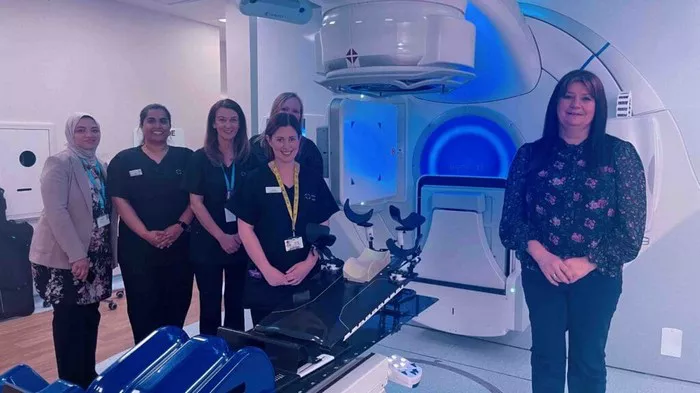A significant advancement in radiotherapy treatment has emerged from the South West Wales Cancer Centre at Swansea’s Singleton Hospital. Patients undergoing radiotherapy for breast cancer in Wales can now undergo treatment without the need for permanent tattoos, marking a pioneering development in the region.
Traditionally, tattoos were utilized to ensure patients were accurately positioned during treatment sessions. However, the center has adopted advanced techniques, rendering tattoos unnecessary while maintaining treatment efficacy.
This breakthrough is not merely a technical innovation but also holds profound psychological significance for patients. Studies indicate that a majority of individuals undergoing radiotherapy prefer to avoid permanent marks or tattoos associated with their treatment.
Previously, patients undergoing radiotherapy would receive three dots tattooed during the CT scan stage for treatment planning. These marks were crucial for aligning patients on the linear accelerator, ensuring precise targeting of radiation doses. However, technological advancements, particularly Surface Guided Radiotherapy (SGRT), have rendered these tattoos obsolete.
SGRT employs body contour mapping obtained during the CT scan, facilitated by a system called Sentinel. This technology enables real-time monitoring of patient positioning during treatment, automatically halting the linear accelerator if any deviation occurs. Consequently, the need for tattoos for alignment purposes has been eliminated.
Sophie Jenkins, the SGRT and imaging lead at the cancer center, emphasized the significance of this development. She highlighted the collaborative efforts of medical professionals over the past five years, culminating in this milestone achievement.
Gaynor Laugharne, one of the first beneficiaries of tattoo-free radiotherapy, expressed her relief and appreciation for the innovation. She noted the positive impact on her emotional well-being, knowing she won’t carry permanent reminders of her treatment.
The success of the trial phase, involving approximately 60 patients, underscores the viability and efficacy of tattoo-less radiotherapy. Moving forward, the center aims to extend this approach to other tumor sites, further enhancing patient experience and minimizing long-term reminders of cancer treatment.
As the Swansea Cancer Center continues its journey of innovation, the ultimate goal remains clear: to prioritize patient well-being and improve treatment experiences while advancing medical technology.

